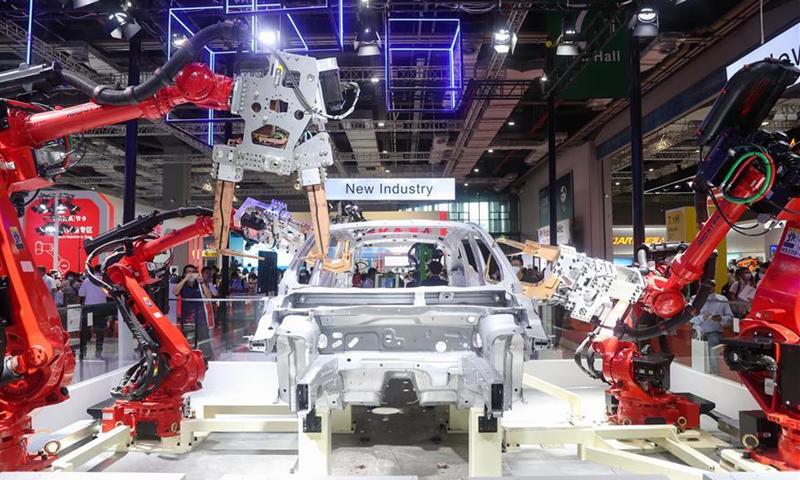Closer manufacturing ties between China, Germany in the making
Source: Global Times Published: 2020/12/22 18:47:08

Photo taken on Sept. 15, 2020 shows the industrial robots at the China International Industry Fair in Shanghai, east China. The five-day China International Industry Fair opened at the National Exhibition and Convention Center (Shanghai) on Tuesday, which attracted over 2,000 enterprises from 22 countries and regions. (Xinhua/Ding Ting)
China and Germany should pivot toward manufacturing and create new types of international organizations and industrial partnership platforms in the spheres of intelligent manufacturing and industrial internet, said a report on Tuesday that envisions closer ties between the two global manufacturing powers.
Released by the Chinese Institute of Electronics at a forum in Beijing, the report said that among measures to foster bilateral cooperation in intelligent manufacturing is a push for indigenous innovation in core technologies.
Speaking at the forum, Xin Renzhou, a former official with the Ministry of Industry and Information Technology, said that intelligent manufacturing is a must-have for China's factory sector, which faces the plight of being big but not strong.
Known for being the only country to have all the industrial categories listed in the UN's industrial classification, China remains at the low and medium ends of global supply and value chains.
The nation still relies on imports for some key technologies and core equipment, according to Xin, noting that imports account for more than 90 percent of the manufacturing and testing equipment used in assembly lines for key parts of high-end computer numerically controlled machine tools, launch vehicles, large aircraft, and cars, among others.
Additionally, 60 percent of industrial robots and more than 85 percent of programmable logic controllers are imported, Xin revealed.
Practice shows that core technologies can't be bought, as buyers may be overcharged or arbitrarily cut off from supplies at the whims of a vendor, he went on to say, calling for efforts to fix the nation's weak links in intelligent manufacturing, thereby avoiding being strangled in key technologies.
In a fresh sign of a crackdown, the US announced on Friday plans to add dozens of Chinese firms to its Entity List including major chipmaker SMIC and dronemaker SZ DJI Technology Co.
As part of efforts to forge a closer manufacturing partnership between China and Germany amid a US-advocated broad decoupling, the Sino-German Intelligent Manufacturing Industry Association was launched at Tuesday's forum.
China and Germany have a lot to learn from each other, Zhang Jianwei, academician of the Hamburg Academy of Sciences, said in a video speech to the forum.
Germany attaches importance to application technology research and practical talent, and it focuses on the real economy rather than merely the virtual economy, while China is known for its embrace of emerging technologies, a large pool of engineers and a huge market, Zhang said.
China unseated the US as Germany's top export market for the first time in the second quarter, according to German official data, speaking volumes for bilateral economic closeness.
Posted in: ECONOMY